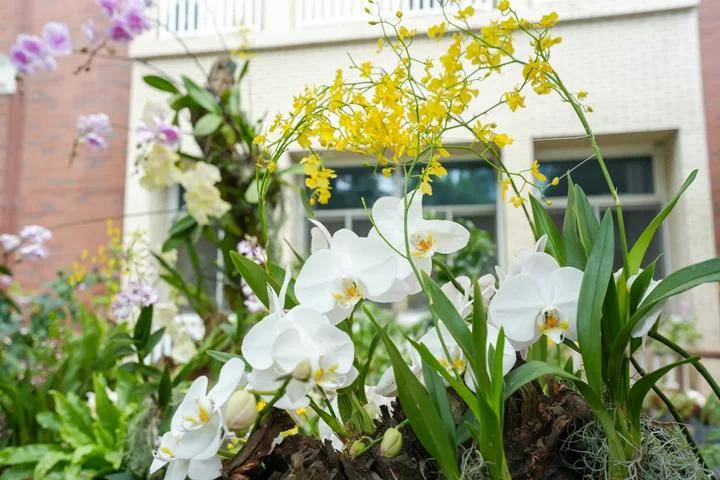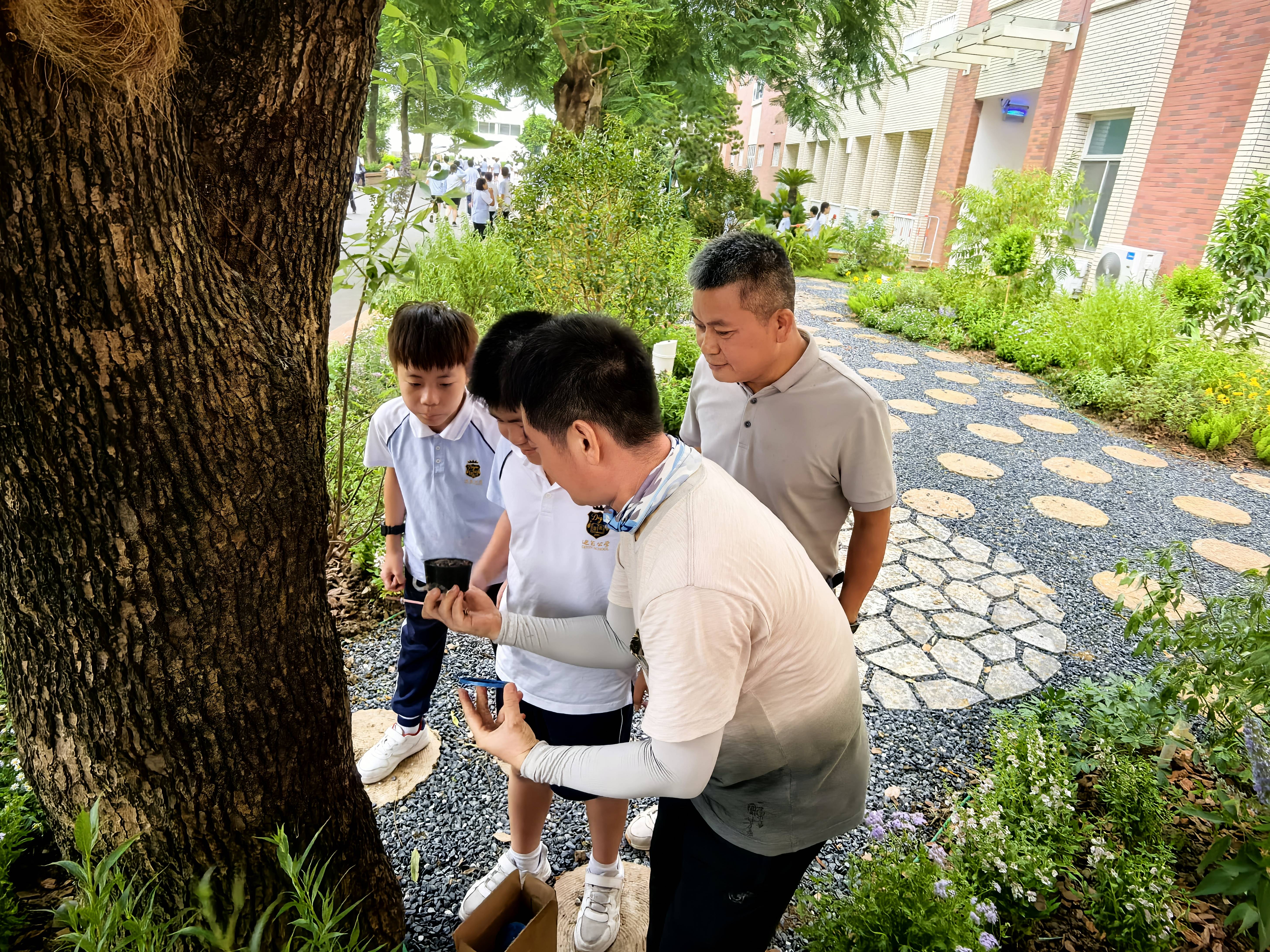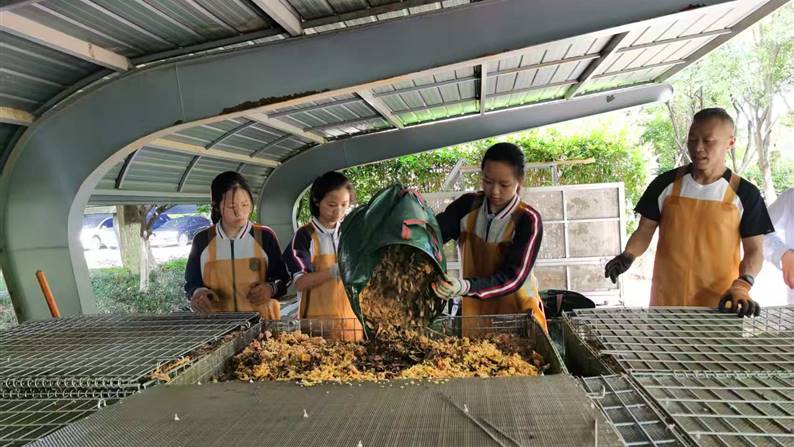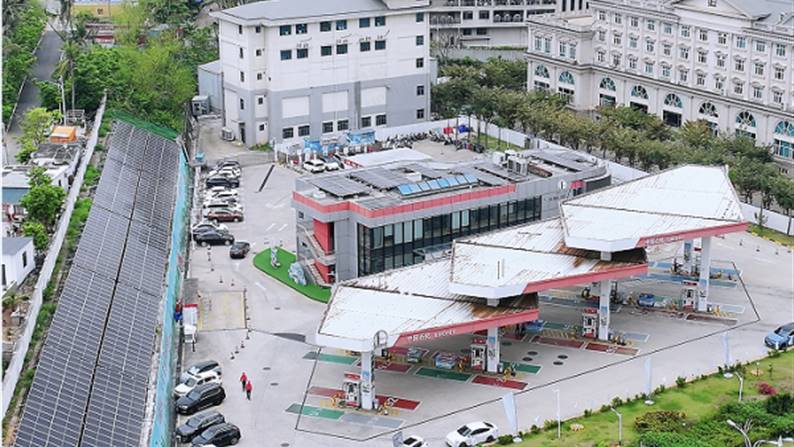

Project Overview
案例概述
Time: Launched in February 2025, under construction
Location: Within the campus of Zhongshan Diyin School
Main Content: Zhongshan Diyin School has established a deep partnership with Shenzhen Xianhu Botanical Garden, leveraging its collection of over 20,000 plant species to create South China’s first integrated campus habitat garden—a 2,300-square-meter complex featuring ten themed botanical exploration gardens. The project innovatively adopts a dual-mentor model integrating “research institutions + basic education,” introducing rare scientific specimens like spinulose tree fern and cycas revoluta. It features specialized zones such as Orchid Garden and Fern Forest, achieving a 5% increase in vegetation coverage. As an International Eco-School, our school plans to establish a “Four-Dimensional Integrated” teaching system which: 1) develops school-based curricula equipped with the interactive “Plant Wisdom Exploration Cards” system; 2) implements a class adoption system where students engage in innovative practices like “transparent water storage devices”; 3) sets up interactive learning stations with “one plant, one QR code” for comprehensive science coverage; and 4) collaborates with Xianhu Botanical Garden on unique activities like “plant fossil rubbing.” Among them, the “earthworm tower installation” vividly demonstrates ecological cycles, with plans to establish a “Junior Botanist” tour guide system comprising 30 student volunteers. The project embodies the philosophy of “making every plant a starting point for science.” By integrating plant cultivation with observation, it has achieved significant increase of ecological literacy in 90% of students. Its “landscape as classroom” design approach provides a dynamic model of “research-empowered education” for campus ecological development in the Guangdong-Hong Kong-Macao Greater Bay Area.
时间:2025年2月启动,持续建设中
地点:中山市迪茵公学校园内
主要内容:中山市迪茵公学与深圳市仙湖植物园深度合作,依托其2万+植物资源库,建成华南首个校园集成型生境花园——十大主题植物科普探究园(总面积2300㎡)。项目创新采用"科研机构+基础教育"双导师模式,引入桫椤、苏铁等珍稀科研品种,打造兰花园、蕨林园等特色园区,实现植被覆盖率提升5%。作为国际生态学校,我校计划创立"四维一体"教学体系:1)开发校本课程,配备"植物智慧探索卡"互动系统;2)建立班级认养制,学生参与"透明储水装置"等创新实践;3)设置互动学习点,通过"一植物一二维码"实现科普全覆盖;4)与仙湖联合开展"植物化石拓印"等特色活动。其中"蚓塔装置"生动展示生态循环过程,计划组建以30名学生为主的"小小植物学家"导览员体系。项目践行"让每株植物成为科学起点"理念,通过植物种植培养及观赏结合,使90%学生生态文明素养显著提升。其"景观即课堂"的设计思路,为粤港澳大湾区校园生态建设提供了"科研赋能教育"的鲜活样板。

Company/Organization Profile
机构简介
Zhongshan Diyin School , founded in 2020, is a non-profit private school offering an integrated twelve-year education. Covering an area of 417 mu, the school currently serves over 10,000 teachers and students. Guided by the philosophy of “cultivating curious minds and fostering warm-hearted education” and upholding the motto “Virtue, Perseverance, Patriotism, and Service to Society,” the school is committed to nurturing well-rounded talent. Since its establishment, the school has achieved remarkable results in education and teaching, with outstanding performances in both senior high school and college entrance examinations, and its teachers and students have repeatedly won major awards. The school places strong emphasis on ecological and environmental education. In 2025, it became one of the first schools in the city to receive the “International Eco-Schools Green Flag” certification. Furthermore, its “Eco-Environmental Education Case” was selected as an exemplary model in Guangdong Province, marking significant accomplishments in building a green and sustainable campus.
中山市迪茵公学创办于2020年,是一所十二年一贯制的非盈利民办学校,占地417亩,现有师生超万人。学校秉持“育有趣灵魂,办温暖教育”理念,以“厚德行远,爱国济世”为校训,致力于培养全面发展的人才。办学以来,教育教学成果显著,中高考成绩优异,师生屡获大奖。学校重视生态文明教育,2025年成为全市首批获得“国际生态学校”绿旗认证的学校,学校申报的“生态环境教育案例”入选广东省先进典型案例,在绿色校园建设上取得突出成就。
Project Outcome
项目成果
1. The vegetation coverage rate has increased by 5%.
2. The first campus-integrated habitat garden in South China has been built, covering 7 types of ecosystems.
3. School-based ecological courses have been developed, benefiting over 5,000 teachers and students across the campus.
1.植被覆盖率提升5%;
2.建成华南首个校园集成型生境花园,涵盖7类生态系统;
3.开发校本生态课程,覆盖全校5000+师生。

Project Highlights
项目亮点
Innovation: Give priority to transforming existing planting beds (100% utilization of original facilities) and pioneer the "Xianhu Research + Campus Scenario" dual-mentor system.
Ecological Synergy: Realize a micro-ecological closed loop through moss carbon sequestration, pollination networks of nectar plants, and other measures.
Evaluation: Experts from Xianhu have praised it as a "model of industry-university-research-application integration"; students have commented that they "have touched the wisdom of life beyond textbooks".
创新性:优先改造既有种植池(100%利用原有设施),首创"仙湖科研+校园场景"双导师制。
生态协同:通过苔藓固碳、蜜源植物传粉网络等实现微生态闭环。
评价:仙湖专家称"产学研用典范";学生反馈"触摸到了课本外的生命智慧"

Project Implementation
项目实施
Resource Integration Phase (November 2024 - April 2025)
Shenzhen Xianhu Botanical Garden provided over 200 species of characteristic plants and technical schemes, while the school renovated 10 existing groups of specialized planting beds. Challenges to overcome: to resolve issues related to waterproofing layer construction in the plant area and create the specific living environments required by the plants.
资源整合期(2024.11-2025.4月):
仙湖植物园提供200+种特色植物及技术方案,校方改造原有10组特色种植池。克服挑战:解决植物区防水层施工难题、植物特有的生存环境营造。

Zoning Construction Phase (June 2025 - November 2025)
Planting areas were divided based on the ecological characteristics and growth habits of plants, simulating natural habitats, including aquatic plants, xerophytic (desert-dwelling) plants, climbing vines, shade-loving ferns and mosses, an orchid garden, a nectar garden, and a pine-fruit garden.
Integrated with the characteristics of local Lingnan medicinal herbs: such as a Chinese herbal medicine garden and a herb garden. Innovations: Transparent water storage devices intuitively are used to demonstrate the water storage capacity of cactus roots. Insect hotels provide breeding, overwintering, and habitat sites for beneficial insects, enhancing the stability of the local ecosystem. Earthworm towers utilize natural biological processes, perfectly combining three functions: waste management, fertilization, and soil improvement, serving as highly intuitive biological devices.
分区建设期(2025.6-11月):
按植物生态性和生长习性为分区原则,模拟自然生境:如水生植物、沙生植物、攀蔓植物、荫生蕨类和苔藓植物、兰花园、蜜园植物、松果园;结合岭南当地特色药理:如百草园、香草花园。创新点:透明储水装置直观展示仙人掌根系蓄水能力。昆虫屋为人益昆虫提供繁殖、越冬和栖息的场所,增强本地生态系统的稳定性。蚓塔装置利用了自然生物的过程,将 waste management(废物处理)、 fertilization(施肥)和 soil improvement(土壤改良)三大功能完美地结合在一起,是非常直观生物装置。

Education Integration Phase (September 2025 - Ongoing)
Developed interactive teaching tools such as "Plant Wisdom Exploration Cards" and jointly organized practical activities (e.g., "Plant Fossil Inheritance Rubbing") with Shenzhen Fairy Lake Botanical Garden.
教育融合期(2025.9-持续):
开发"植物智慧探索卡"等互动教具,联合仙湖开展"植物化石传承拓印"等实践活动。
Project Impact & Sustainability
项目影响力、可推广性与可持续性
1. Technological and Mechanism Innovation
The initiative pioneered a “dual-mentor system” (Xianhu experts in collaboration with on-campus teachers) as a coordinated education mechanism. It developed a replicable ecological curriculum system, supported by intelligent tools of science popularization such as the Plant Wisdom Exploration Card and the One Plant, One QR Code mechanism. Together, these elements established a standardized teaching process based on the sequence of “observation–interaction–practice–co-creation.”
1.技术机制创新
首创"双导师制"(仙湖专家+校内教师)协同育人机制,开发可复制的生态课程体系,配备"植物智慧探索卡""一植物一二维码"等智能科普工具,形成"观察-互动-实践-共创"的标准化教学流程。

2. Demonstration Value for the Sector
As a flagship project of international eco-schools, it has introduced an integrated habitat garden design (encompassing seven ecosystem types) and a class-based management model. These practices provide a quantifiable reference paradigm for campus ecological development in the Guangdong–Hong Kong–Macao Greater Bay Area, achieving a 5% increase in vegetation coverage, the first of its kind in Zhongshan City.
2.行业示范价值
作为国际生态学校标杆项目,其集成型生境花园设计(涵盖7类生态系统)、班级认养制管理模式,为粤港澳大湾区校园生态建设提供了可量化的参考范式,植被覆盖率提升5%,在中山市为首创。
3. Sustainable Development Plan
Over the next three years, the initiative will advance the “Threefold Development Strategy”:
① Digitization of the curriculum system, including the development of a plant observation platform; ② Integration of shared resources, through the joint establishment and sharing of a germplasm resource bank with Shenzhen Xianhu Botanical Garden; ③ Socialization of practice, by organizing “campus ecology workshops” in collaboration with local schools, with an expected outreach to more than five schools.
3.持续发展计划
未来三年将推进"三化建设":①课程体系数字化,开发植物观察平台;②资源网络化,与深圳仙湖植物园共建共享种质资源库;③实践社会化,联合辖区内学校开展"校园生态工作坊",预计辐射超5所学校。
(Using AI translation)
(使用AI翻译)

零废弃学校建设之厨余垃圾篇
10-24 · 来源:中国浙江省宁波市鄞州第二实验中学 · 作者:中国浙江省宁波市鄞州第二实验中学

能源至净,生活至美,积极打造碳中和
10-24 · 来源:中国石化销售股份有限公司海南海口石油分公司 · 作者:中国石化销售股份有限公司海南海口石油分公司

无锡中瑞低碳生态城
10-23 · 来源:无锡中瑞低碳生态城 · 作者:无锡中瑞低碳生态城